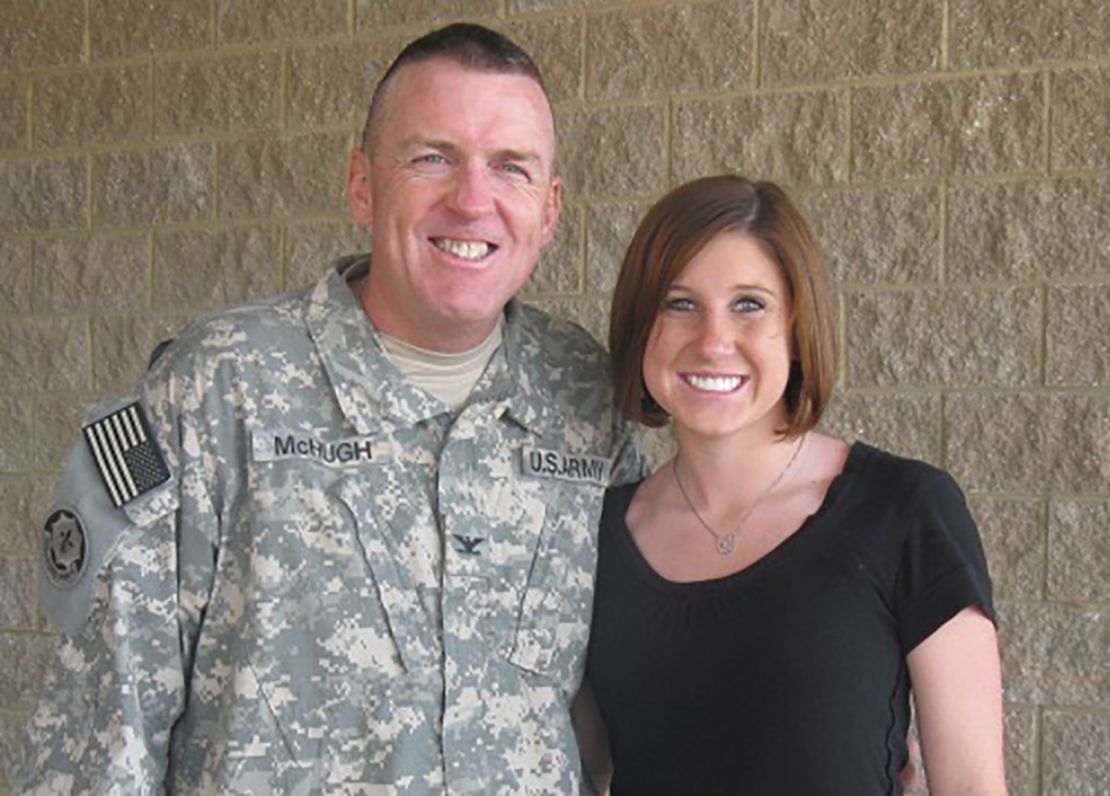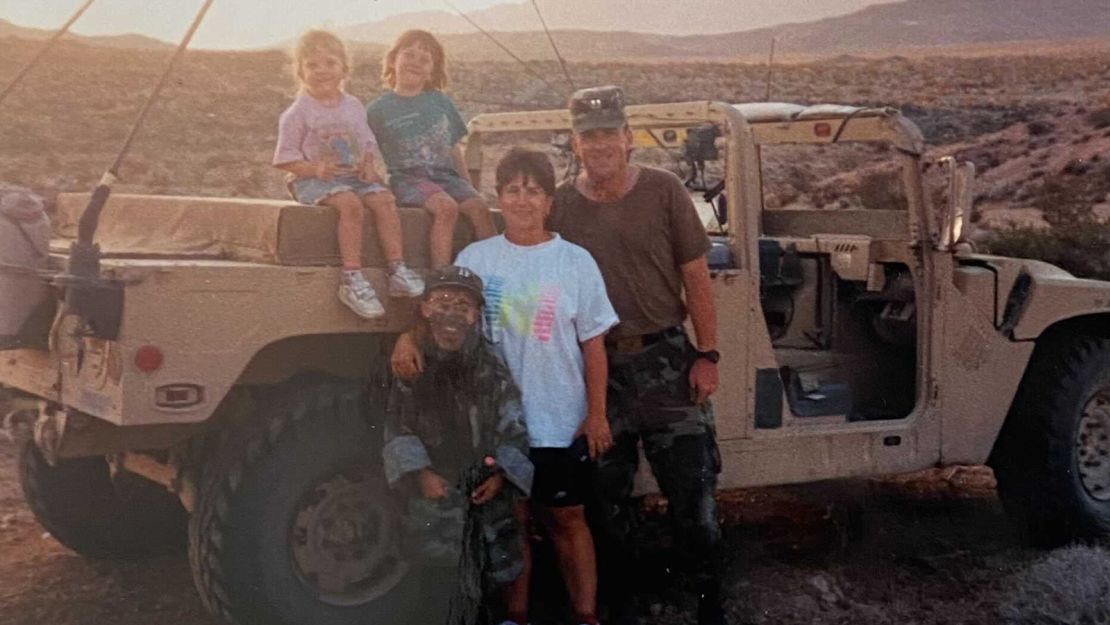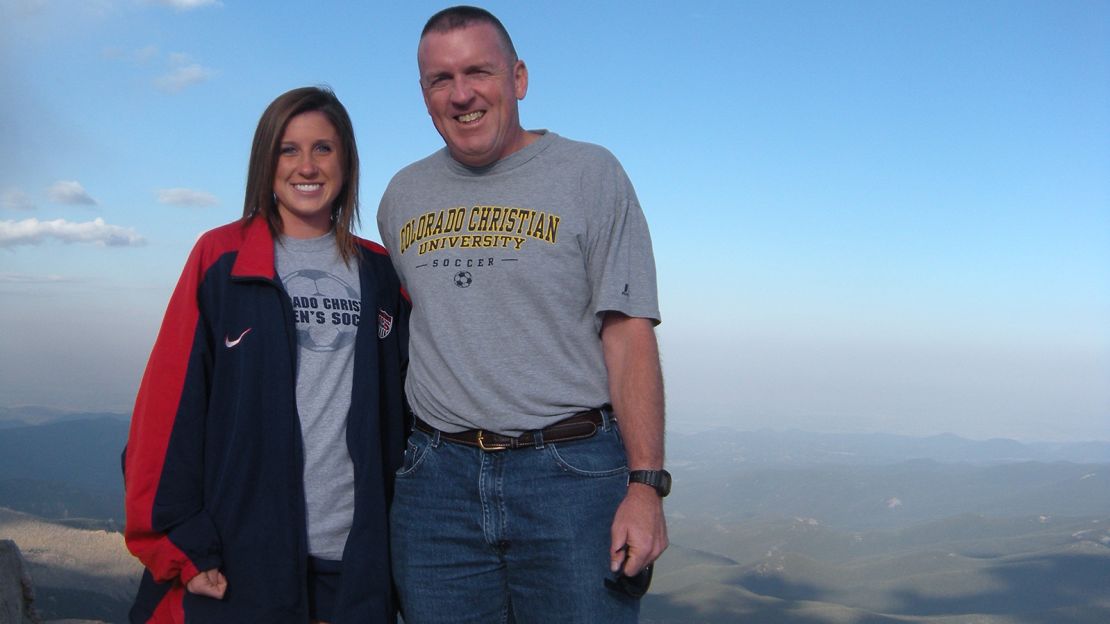Editor’s Note: Kelly McHugh-Stewart is a writer based out of New York City. Her reporting and personal essays have appeared in the New York Times, The Washington Post, Reader’s Digest and Sports Illustrated, among others. She is currently working on a memoir about sacrifice, legacy, and finding meaning in the Forever War. The opinions expressed in this commentary are her own. View more opinion on CNN.
My first child is due September 13, just around the 20th anniversary of the 9/11 terror attacks. He’ll never get the chance to meet his grandfather.
My father, US Army Colonel John M. McHugh, was killed in Afghanistan. Though the United States involvement in Afghanistan ended on August 31, my son will feel the war’s ripples. As he grows up with only stories about his grandfather, the man he’ll share a name with, the Forever War will haunt him in ways that, over the past decade, they’ve haunted me. I’m already bracing for the day he starts asking questions.

“Why did he have to die?” he may ask.
I wish I had a good answer.
I was 18 on May 18, 2010, when my father’s convoy was hit by a suicide bomber on the streets of Kabul. The attack killed more high-ranking officers than the war had seen in its then-nine years, and the Taliban took credit for it immediately.
Like anyone hit with the news of losing a loved one too soon, I was rocked by my father’s sudden, unexpected death – my world shaken. But amid the pain and grief, there was also confusion. In the months, then years, then decade that followed, I was filled with questions that, no matter where I looked or who I talked to, were never answered. I wanted to know what exactly we were doing in Afghanistan and what the endgame was. I wanted to know that my dad’s life was at least part of progress towards a bigger plan. I felt my country owed me that.

As the war in Afghanistan comes to an end, what are Gold Star families like mine supposed to feel? As we watch the Taliban take over the country, what does that mean for the legacies of the ones we’ve lost? What do we have to show for their lives? I’d always thought ending the Forever War would provide some kind of meaning in my father’s death, but that has been hard to find, and I’m trying to come to terms with the fact that maybe I’ll never find it.
Since President Joe Biden announced the withdrawal earlier this year, I’ve been following the commentary surrounding the decision closely. Words from podcasts, newscasts, essays and military Twitter swirl through my head. I’ve read the personal stories from veterans, listened to thoughts on the withdrawal from politicians and military leaders and followed the devastating reports from the ground in Afghanistan. Though this withdrawal is what I’ve been waiting for, longing for, since my father’s death, it doesn’t feel the way I thought it would.
I was 10 years old on September 11, 2001. At the time, my family was one month into a three-year assignment in Geibelstat, Germany. That afternoon, helicopters from the Army post flew low above our neighborhood, the loud thud, thud, thud, thud of their blades slicing through the silent streets. I was scared and remember worrying about my dad – Giebelstadt Army Airfield went on lockdown and I was nervous he would never be able to come home from work. It’s been 20 years, but my memories of that day are crystal clear.

There was no doubt then our nation would go to war, that we’d, as President George W. Bush put it, “find out who did this, and kick their ass.” A month later, on October 10, 2001, Operation Enduring Freedom officially began. In the war’s first two years, the United States was making headway. The why behind the war wasn’t difficult to see then. Though we’d yet to capture Osama bin Laden, the mastermind behind the 9/11 attacks, Al Qaeda and the Taliban were retreating and reconstruction efforts in Afghanistan were on the horizon. By May of 2003, Secretary of Defense Donald Rumsfeld declared, “We have concluded we’re at a point where we clearly have moved from major combat activity to a period of stability and stabilization and reconstruction activities. The bulk of this country today is permissive, it’s secure.”
This is the first of many times that we heard of a conclusion to the War in Afghanistan. And it’s here that I begin playing the dangerous game of “What if.” What if we hadn’t shifted our focus to Iraq in 2003 and, instead, really finished what we started in Afghanistan? Would my dad still be alive today? What if we’d pulled out in 2011, like President Barack Obama promised? Would my Gold Star friends’ parents, spouses, siblings, sons and daughters still be alive today?

As I look back at the past 20 years, the war in Afghanistan has been one of the most defining factors of my life. Even before my father’s death, I spent nearly a decade watching him and my friends’ parents come and go. When they weren’t at war, they were often “in the field” training for war. I was just a kid then, unaware of the realities of the world, yet the undercurrent of war was everywhere. As an Army brat, I’d sometimes worry about what it would be like if two soldiers showed up at my front door to give our family heartbreaking news about my dad. Even just thinking about that scared me. So instead, I tucked those thoughts deep inside and prayed for my dad and our troops every single night. Then, in 2010, I was forced to face what I had dreaded and those fears became my reality. The two soldiers. The 21-gun salute. The slow, somber playing of Taps.
Though I was almost 4,000 miles away, living in Germany on September 11, 2001, I’ve always felt connected to the day. I didn’t know anyone in the Towers, I don’t think I even knew anyone in New York City, yet it was a day that shaped my life in ways I never could have imagined as I sat in front of my family’s television with my mom, unable to grasp what I was watching.
Today, as I reflect on that day, that moment, all I can think about is my son. In the same way, I can’t promise him he won’t experience heartbreak, I can’t promise him he’ll never experience war. But what I can promise him is that, as an American, I won’t sit idly by as the nation I love partakes in another Forever War. A war with an evolving meaning, if any at all, and no defined outcome. A war riddled with mistakes too easily swept under the rug.
Get our free weekly newsletter
Over the past few weeks of watching horrific scenes unfold in Afghanistan, I’ve often wanted to scream at our country, a country that has largely turned a blind eye to the war and left it to be carried by its one percent, all-volunteer military force. “This can’t happen again. This can’t happen again,” I’ve told myself, over and over.
I don’t know where we go from here, but I do know that if we want to honor the legacies of the nearly 2,400 service members we’ve lost in Afghanistan, we must draw from the lessons learned over the past 20 years. We can’t let this happen again.
